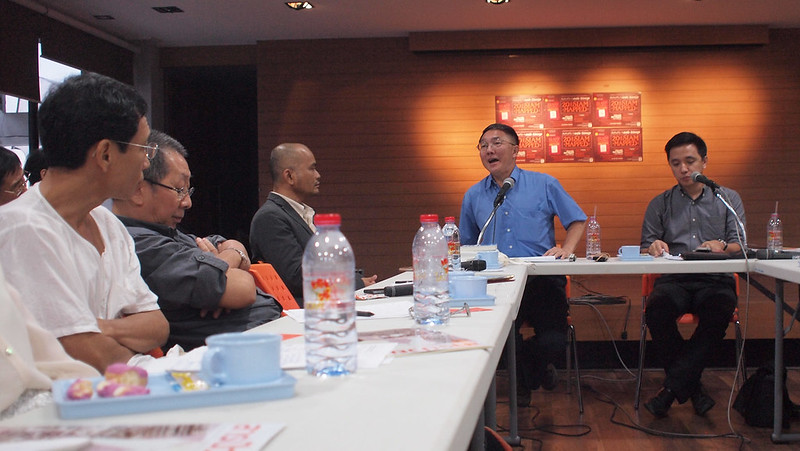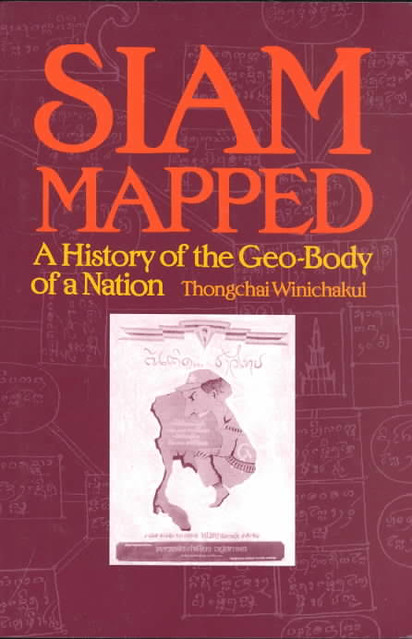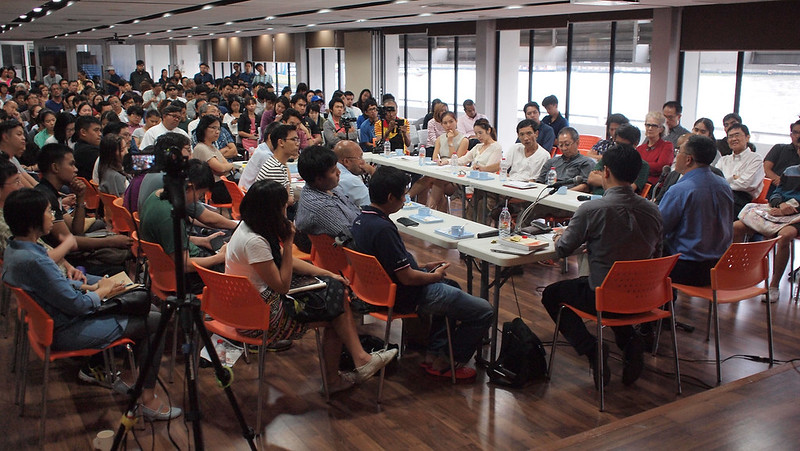27 years later, a renowned historian’s 1988 groundbreaking book on Thai royal nationalism and geography is still garnering new interpretations and discussion.
Thongchai Winichakul, a professor of Southeast Asian History at the University of Wisconsin-Madison whose best-known work is Siam Mapped: A History of the Geo-Body of a Nation, offered authorial insights at a public discussion held at Thammasat University on 3 October 2015. The event was organized by Thammasat University’s Faculty of Sociology and Anthropology as well as the same university’s Center for Southeast Asian Studies.
Siam Mapped is hailed among both international and local academic fields as being crucial to the understanding of the creation of Thai nationhood and identity. In the text, Thongchai presents how modern Thailand was created through implementation of European mapping technology, which drew concrete, exact lines on previously nebulous lines. The result was a mapped nation, with every inch of the land able to be demarcated and ruled over.
Thongchai, in blue, speaks on retrospective thoughts about his book, Siam Mapped. On the far right is the event moderator, Prajak Kongkirati, lecturer at Thammasat’s Faculty of Political Science.
At the discussion, Thongchai offered his insights as an author looking back on a work published 27 years ago.
“Writing Siam Mapped was my catharsis for 6 October,” he said, referring to the Thammasat Massacre in 1976, when hundreds of students were shot, beaten to death, and hanged by security forces and right-wing mobs. Thongchai, who was studying at Thammasat at the time, was one of the hundreds arrested during the protests, and one of of the 19 to suffer long-term detention.
After he was released, he completed his education at Thammasat in 1981 and studied at the University of Sydney for his graduate studies, when he formulated research and ideas for Siam Mapped.
Thongchai stated that as part of his cathartic writing process, he was compelled by a desire to tell a riveting, “good” story that was different from the regular historical narrative.
On a scholarly level, he wanted to tell a sound narrative that was grounded to reality, not loaded with jargon, and provocative “to the extent that it is hard to ‘take in.’” The former student activist wanted his work to counter both the dominant royal-nationalist (ราชาชาตินิยม) history as well as leftist and Marxist views. For example, Thongchai warned about the power of the general public, not only the state or the ruling class, in constructing royal nationalism through constant recreation until the point where “fellow citizens could be as scary as the state.”
In terms of ideological presentation though, Thongchai prefers subtlety. “The charm of a history book, or any story, is not getting up on a soap box and explicitly stating your views. You let the reader decide what they want to believe with the given story,” continued the author-professor. A historical story needs both an ideological standpoint and a sophisticated presentation, he said.
Siam Mapped, by Thongchai Winichakul
Thongchai also discussed fully embracing the “uselessness” of humanities and history. He stated that as a humanities academic, he did not believe in in constantly justifying the “usefulness” of the humanities through constant reminders of its use in miscellaneous fields. Instead, he emphasizes the ironic importance of this “inutility.” For instance, his graduate study on maps, of all things, could not be repurposed by others into tools for neither nationalistic pride nor revolution.
“There is no need to justify the usefulness of humanities,” said the passionate, bespectacled man, “the second you accept that human knowledge comprises not only scientific deductions, but also interpretations from language and culture.”
Siam Mapped can also be read in multiple ways: by looking at the surface story of maps and geography, the layer below that about implications of internal colonialism and anti-royal-nationalism, and even the narrative layer below that, as an allegorical tale. As for what Siam Mapped could refer to, Thongchai stated that interpretations were up to, and welcomed by readers.
Academics as well as the general public gather to listen to the discussion on Siam Mapped.
Discussions included questions and critiques from both fellow renowned historians as well as the public audience. A question critiquing the book for not including political or economic factors in mapping Siam was raised. Thongchai replied that he actually went through the book and crossed out any economic or political factors, since he wanted to focus on the community and the public reading it.
To wrap up the event, Thongchai stated that there will be no second edition of Siam Mapped: he had no desire to add or edit anything, but wanted it to stay as his cathartic piece, which would hopefully allow readers to continue interpreting it.
He is happy, he says, if only academics read his books, since he wants to be part of building the “weak” Thai ivory tower knowledge base. “I will never, ever be a Facebook activist like Somsak,” he laughed, referring to the famously outspoken academic Somsak Jeamteerasakul, currently exiled in France.
As the event wound down, a man stood up from the audience and introduced himself as a Mom Luang. “I’m so impressed by you, even though I haven’t read your book,” he said, referring to Thongchai. “I was told you were an extreme red shirt, but after hearing you speak, I don’t think that’s the case. When I get powerful, I’ll take you along with me.” The audience twittered and ooh-ed and aah-ed.



